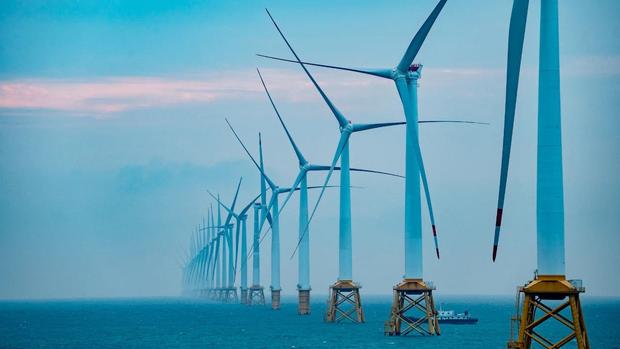 This undated file photo shows the Yangjiang Nanpeng Island offshore wind farm. (PHOTO / CHINA GENERAL NUCLEAR POWER CORP)
This undated file photo shows the Yangjiang Nanpeng Island offshore wind farm. (PHOTO / CHINA GENERAL NUCLEAR POWER CORP)
BEIJING - Facing the pressure of increasing uncertainties in the global energy market caused by international geopolitical conflicts, China has pledged maximum efforts to safeguard its energy supply.
Despite the external pressure, China still possesses the capability to guarantee a secure, reliable and stable supply of energy, said Fu Linghui, a spokesperson with the National Bureau of Statistics.
Despite the external pressure, China still possesses the capability to guarantee a secure, reliable and stable supply of energy, said Fu Linghui, a spokesperson with the National Bureau of Statistics
ALSO READ: China's coal output grows to stabilize market supply
For the first quarter of 2022, the country's raw coal output rose 10.3 percent year on year to 1.08 billion tonnes, while crude oil output saw steady expansion by rising 4.4 percent and power generation rose 3.1 percent from a year ago to reach 1.99 trillion kilowatt-hours.
As energy serves as the fundamental underpinning of economic and social development, an earlier State Council executive meeting called for further enhancing the energy supply and optimizing the energy mix.
Coal Still Counts
For now, coal still serves as the major energy pillar in China, and will still guarantee the country's energy and power security for some time as the country has sufficient coal resources, said Yu Bing, deputy head of the National Energy Administration.
Last year, coal produced 60 percent of the country's electricity with an installed capacity of less than 50 percent, Yu said.
To ensure this year's coal supply, the country will strive to increase coal production capacity by 300 million tonnes by approving higher production capacity, expanding output and putting new projects into operation.
A total of 100 billion yuan (about $15.11 billion) of reloans will be issued by China's central bank to support coal development and energy storage.
ALSO READ: Vice-premier urges clean use of coal
Simultaneously, over the next 11 months, starting May 1, seven types of imported coal products including coking coal and brown coal will enjoy zero tariffs, according to the Customs Tariff Commission of the State Council.
China will also promote the clean and efficient use of coal and strengthen the construction of storage facilities, accelerating the clean and low-carbon transformation of power systems.
"Coal is the most economically feasible, reliable and flexible energy source under the current technical conditions," Yu said.
Renewable Energy
As part of the country's efforts to pursue carbon peaking and carbon neutrality goals, renewable energy has a key role to play.
China's installed capacity of renewable energy logged rapid growth in the first quarter of the year.
In the January-March period, the capacity of wind power jumped 17.4 percent year on year to 340 million kilowatts, while solar farms saw capacity reach 320 million kilowatts, with an increase of 22.9 percent.
As hydrogen has become an important strategic choice for major developed economies seeking to accelerate their energy transformation and upgrading, China is also blueprinting the future for hydrogen.
READ MORE: China's renewable energy capacity expands in Q1
Annual hydrogen production from renewable energy is expected to reach 100,000 tonnes to 200,000 tonnes to become an important part of new hydrogen energy consumption by 2025 and enable a carbon dioxide emission reduction of 1 million to 2 million tonnes per year, according to a plan for the development of hydrogen energy for the 2021-2035 period.
Meanwhile, nuclear power will also be developed in a well-paced manner on the premise of ensuring absolute security and exercising strict oversight. China has recently approved new generating units at three nuclear power stations.


